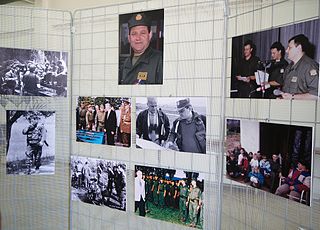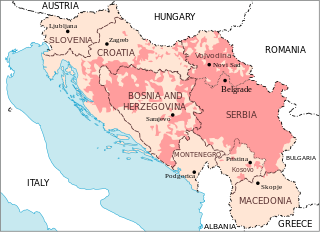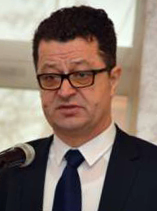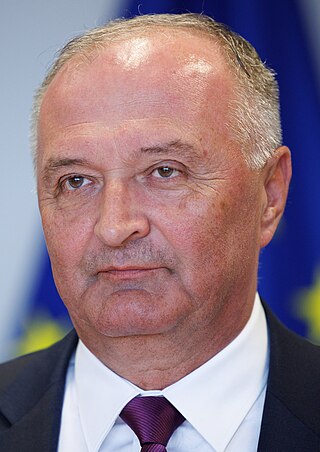
The Armed Forces of Bosnia and Herzegovina is the official military force of Bosnia and Herzegovina. The BiH armed forces were officially unified in 2005 and are composed of two founding armies: the Bosniak and Croat Army of the Federation of Bosnia and Herzegovina (VFBiH) and the Bosnian Serbs' Army of Republika Srpska (VRS).

Vrlika is a small town in inland Split-Dalmatia County, Croatia. The closest large towns are Sinj, Knin, and Drniš. Vrlika was given the status of town in 1997. Vrlika is an underdeveloped municipality which is statistically classified as the First Category Area of Special State Concern by the Government of Croatia.

Ivo Pilar was a Croatian historian, politician, publicist and lawyer, considered the father of Croatian geopolitics. His book The South Slav Question is a seminal work on the South Slav geopolitical issues.

Victory and Homeland Thanksgiving Day and the Day of Croatian Defenders is a public holiday in Croatia that is celebrated annually on 5 August, commemorating the Croatian War of Independence. On that date in 1995 the Croatian Army took the city of Knin during Operation Storm, which effectively brought an end to the Republic of Serbian Krajina proto-state. In 2008, the Croatian Parliament also assigned the name Day of Croatian Defenders to the holiday, which honors the current service members and veterans of the Armed Forces of Croatia.

The Homeland War Memorial is a Croatian state medal awarded to both Croatian and foreign citizens who participated in the nation's Croatian War of Independence as a volunteer, part of the Croatian Army and Croatian Council of Defence or in some other role.

Mladen Markač is a Croatian retired general. He was a Commander of Croatian Special Police during Operation Storm during the Croatian War of Independence (1991–1995), and afterwards held the rank of Colonel General. Later, he was indicted by the International Criminal Tribunal for the Former Yugoslavia (ICTY) for war crimes committed during Operation Storm by Croatian forces against the Serbs from Croatia. In April 2011, the ICTY found him guilty and sentenced him to 18 years.
Juraj Njavro was a Croatian medical doctor and politician.

The 7th Corps, was an army corps of the Army of Republic of Bosnia and Herzegovina active during the violent breakup of Yugoslavia and subsequent Bosnian War. It was one of six army corps, the 6th Corps was disbanded on February 26, 1994 and the 8th Corps was never formed.

The foreign relations between Bosnia and Herzegovina (BiH) and Croatia are bound together by shared history, language, neighboring geography and cultural commonalties. They established diplomatic relations in 1992, following the dissolution of Yugoslavia and independence of Croatia. The two countries share a 932-kilometer (579 mi) border – the second longest external land border in the European Union (EU). Modern relations between the two states are functional but remain tense after ineffective 21st-century attempts at détente.
Tomislav Merčep was a Croatian politician and paramilitary leader during the Croatian War of Independence who was later convicted of war crimes.
The World Veterans Federation (WVF) is the world's largest international veteran organisation. The federation consists of 172 veterans organizations from 121 countries representing some 60 million veterans worldwide.
Baljci is a village in the Municipality of Tomislavgrad in Canton 10 of the Federation of Bosnia and Herzegovina, an entity of Bosnia and Herzegovina. The village belongs to the local community of Šujica. Until 1945, the village was administratively part of the Srez of Livno.

From August 1990 to November 1991, during the breakup of Yugoslavia, several Serb Autonomous Regions, Districts were proclaimed in the Yugoslav republics of SR Croatia and SR Bosnia and Herzegovina in light of the possible secession of the republics from the Socialist Federal Republic of Yugoslavia. These were autonomous Serb-inhabited entities that subsequently united in their respective republic to form the Republic of Serbian Krajina in Croatia and the Republika Srpska in Bosnia and Herzegovina.

Association of Croatian Orthodox Believers, often called Croatian Orthodox Union was a civic association in Croatia that formed for the reestablishment of the Croatian Orthodox Church, an Eastern Orthodox autocephalous church that existed from 1942 to 1945, created by the Ustaše in the Independent State of Croatia.
Croat People's Union was a Bosnian Croat political party in Bosnia and Herzegovina. Party was founded by Ivo Pilar in 1910 with goal to represent interests of Croats in the Condominium of Bosnia and Herzegovina. With creation of Kingdom of Yugoslavia, HNZ become inactive and was refounded in 1992 by Milenko Brkić and in 2010 it was incorporated into the Croatian Party of Rights of Bosnia and Herzegovina.

Martin Raguž is a Bosnian Croat politician who served as Chairman of the Council of Ministers of Bosnia and Herzegovina from 2000 to 2001. He was a member of both the national House of Representatives and House of Peoples.
The Croatian War of Independence (1991–1995) is said to have attracted "mercenaries, adventurers and idealists", most joining the Croatian side.
Bosnian Muslim paramilitary units, that is militias or paramilitary units made up of Bosnian Muslims (Bosniaks) in war.
Davor Jović was a prominent Croatian soldier, kickboxer and kickboxing trainer.

Zukan Helez is a Bosnian politician serving as Minister of Defence since January 2023. He is also the current Vice-chairman of the Council of Ministers of Bosnia and Herzegovina, serving alongside Staša Košarac. He was previously a member of the national House of Representatives from 2018 to 2023.











